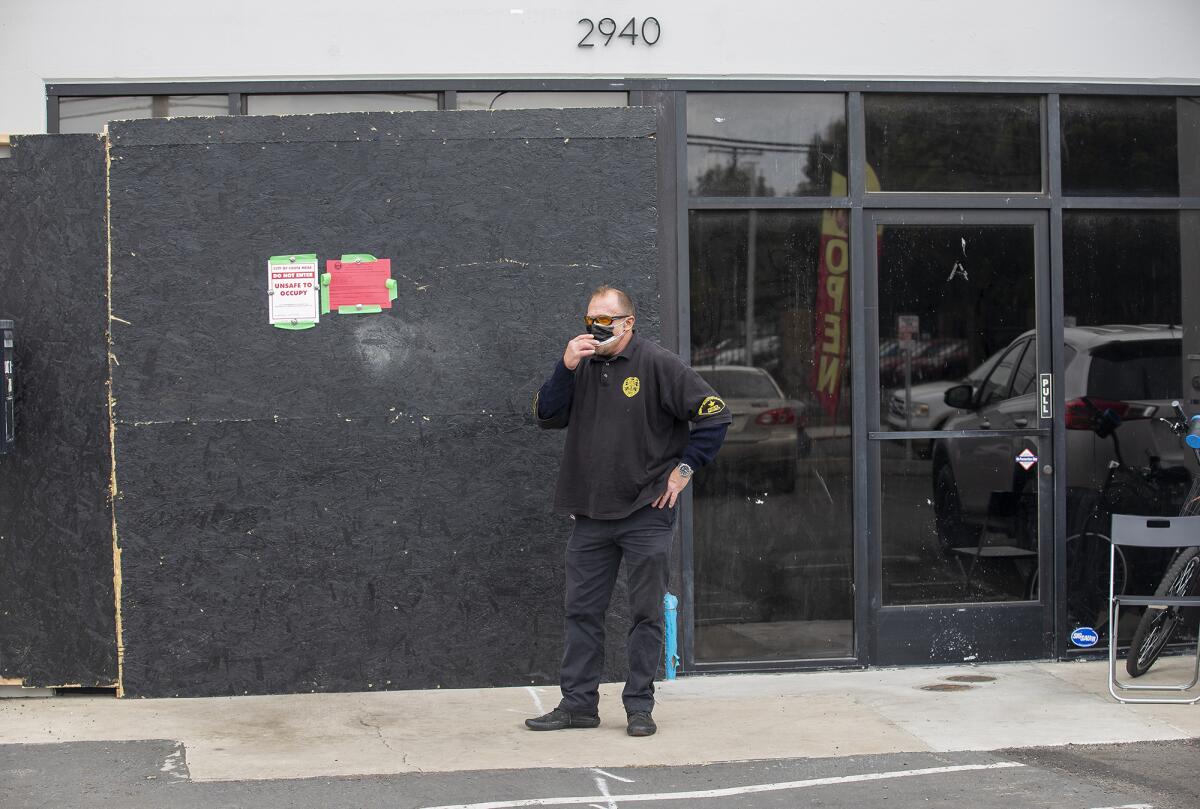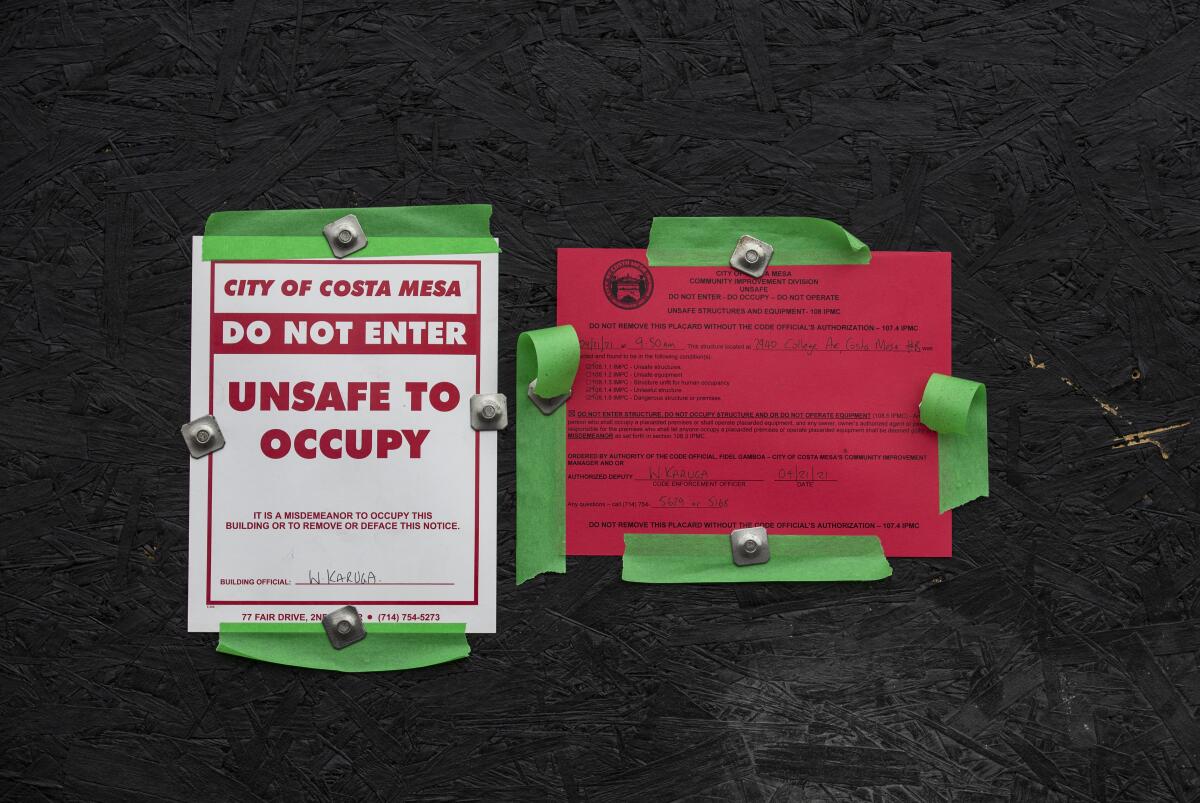Costa Mesa hopes legal cannabis dispensaries will alleviate city’s pot problem

- Share via
On 4/20 — a date known to marijuana enthusiasts nationwide — the Costa Mesa City Council passed an ordinance regulating retail cannabis sales and delivery in commercial areas, a move they say will help curtail illegal dispensaries run amok.
Officials have long described an influx of illicit operators, selling wares in nondescript storefronts to unsuspecting or undiscriminating clients, and the immensity of city resources it takes to shut them down.
“In Costa Mesa, you have an unquestionable demand for cannabis. [And] the demand is being filled by illegal operators, or trap shops,” Mayor John Stephens said Tuesday.
“They’re selling unregulated products to our consumers. One way you can get rid of illegal dispensaries is to bring a legal market in,” he continued.

Hours before the council’s discussion, Costa Mesa police officers assisted as agents from the state’s Bureau of Cannabis Control raided and shuttered the Holy Fire, a dispensary on the city’s radar for operating without permission.
BCC spokesman Alex Traverso confirmed Tuesday officers moved quickly on the property, located at 2940 College Ave., during the early morning bust. More than $400,000 of product was seized.
“We move in and basically take everything out of the shop — product, shelves, monitors, ATMs ... everything,” he said of the process in an email. “Then we board up the door. The key is to make it as tough to reopen as possible.”
A lone security officer on Thursday was still guarding the boarded-up premises where, days earlier, employees had been ringing up marijuana flowers, edibles and vape cartridges.
The city maintains a list of bad actors, with updates on whether an illegal dispensary is being actively investigated, is a case with the city attorney’s office or has been successfully closed.
This week’s raid makes The Holy Fire the 15th shuttered pot shop to date in Costa Mesa. Fourteen more sites continue to operate illegally, while four are actively being pursued for closure.
An ordinance will allow city officials to implement Measure Q, passed by 65% of voters in November, and regulate legal cannabis dispensaries and delivery businesses by setting parameters on how, where and when they can operate.
Initial estimates showed tax revenues generated by new businesses could bring in $3 million annually.
Under the new law, store owners would seek a conditional use permit and undergo review by the city Planning Commission. No new business is permitted on a property where an illegal business has operated until one year has passed and the owner has fully compensated the city for any expenses related to that illicit operation.
Retail storefronts must maintain a 1,000-foot distance from K-12 schools, playgrounds, child daycare centers and homeless shelters and stay 600 feet away from youth centers where children recreate.
Planning commissioners and members of a city ad-hoc committee, which included Stephens and fellow council members Manuel Chavez and Loren Gameros, have been hashing out details and definitions in a series of meetings and talks with cannabis industry experts.
The ordinance incorporates commissioners’ revisions to a draft of the law, but also includes several last-minute recommendations made by the ad-hoc committee and adopted Tuesday in a motion made by Stephens.
As such, a 500-foot distance buffer between shops recommended by the Planning Commission was removed. A stipulation prohibiting felons from owning or working in dispensaries for seven years following conviction was revised to exempt felonies reduced to misdemeanors under California’s Proposition 64.
The committee also defined the perimeter of a playground as being 30 feet from the physical play equipment, as opposed to a park’s property line. No provision was made to buffer private playgrounds from retail cannabis businesses.
“What are we trying to do, protect only public playgrounds?” asked Costa Mesa resident and Santa Ana cannabis retailer Rob Taft during a public comment period. “It defies logic, if we’re trying to protect children, to exclude specifically and especially a private playground.”
The city will levy a 7% tax on all cannabis goods, on top of a 15% state excise tax and a 7.75% sales tax. From that, 1% will be spent on implementing a citywide arts master plan and a first-time homebuyer program for residents.
Industry experts on Tuesday suggested a high taxation rate would cause businesses to go to cities like Santa Ana and Long Beach, where adult use is taxed 6% and medical patients pay 5%. Kandice Hawes, executive director of the O.C. chapter of the National Organization for the Reform of Marijuana Laws (NORML) said too high a rate could boost black market sales.
“If you want to get rid of the illicit operators, 7% is only going to drive customers back to those markets,” she said.
In their own comments, council members Don Harper and Arlis Reynolds, who respectively represent Council Districts 1 and 5, said they could not support the ordinance as presented.
“If I had my druthers, I probably wouldn’t have Costa Mesa have cannabis. And if I did, I’d put it in the industrial zones,” Harper said, indicating tax revenue as the main motivating factor behind the city’s support of Measure Q.
“I don’t think that’s a reason why we should do cannabis, but we are,” he added.
Reynolds said the process was too rushed, failed to answer looming questions and stood to further disadvantage neighborhoods near commercial areas where residents already suffer from historic inequities, like a lack of park space.
“It’s the sort of inequity I don’t think we’ve addressed here, and it makes me uncomfortable,” Reynolds said, also pointing out a lack of communication with the city’s non-cannabis businesses. “We should do a better job and take the time to do better outreach.”
The council favored the ordinance with a 5-2 vote, with Harper and Reynolds opposed.
All the latest on Orange County from Orange County.
Get our free TimesOC newsletter.
You may occasionally receive promotional content from the Daily Pilot.




